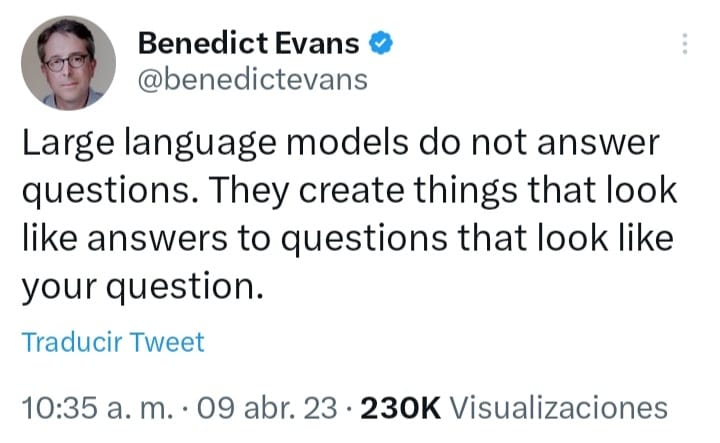[2023]
December
November
October
September
August
July
June
May
April
March
February
January
[2022]
[2021]
[2020]
[2019]
[2018]
[2017]
[2016]
[2015]
[2014]
[2013]
[2012]
[2011]
[2010]
[2009]
[2008]
[2007]
[2006]
[2005]
[2004]
[2003]
Yesterday, I read an interesting article titled Can Intelligence Be Separated From the Body? published by The New York Times. The first few paragraphs pose the key question:
And, of course, if that's the case, it seems unlikely that a disembodied AI like ChatGPT (and most other forms of AI developed so far, at least the ones that are shocking us in the news) will ever be able to achieve anything close to human intelligence, at least in the short and middle term. Yet, the danger is precisely that we may believe what these tools are achieving is indeed something like human intelligence, even though it is not. This reminds me of an image a friend recently shared via Facebook:What is the relationship between mind and body?
Maybe the mind is like a video game controller, moving the body around the world, taking it on joy rides. Or maybe the body manipulates the mind with hunger, sleepiness and anxiety, something like a river steering a canoe. Is the mind like electromagnetic waves, flickering in and out of our light-bulb bodies? Or is the mind a car on the road? A ghost in the machine?
Maybe no metaphor will ever quite fit because there is no distinction between mind and body: There is just experience, or some kind of physical process, a gestalt.
Bingo! ChatGPT is as good as the data we feed it, which is why if we feed it racist data it ends up making ugly, racist comments. Or, to put it a different way, if we feed it data from millions of people stating that 2+2=5, ChatGPT will spit out that obviously incorrect answer (I'm obviously simplifying). No human being (well, your average one, I suppose, since there are flat-earthers out there) would be so gullible, though.

In the end, it all boils down to the same issue: ultimately, our current scientific paradigm is still based on the old mechanistic premise according to which we should be able to explain the totality if we manage to break it down into its individual components, and then manage to explain each one of them separately. Yet, reality is not like that. The world out there is a system, and it should be view, interpreted and studied as such. Or, in this case, intelligence is something that goes way beyond whatever goes on inside our brains. It also involves our bodies. {link to this entry}
Seen on Plaintext, a weekly newsletter written by Steven Levy sent to my inbox by the folks at Wired magazine:
So, as it turned out, RMS was correct. Yes, sure, the guy is "a prick". Yes, he never compromises. Yes, he is a purist. But he was right. {link to this entry}"One important thing to understand about this conflict is that ebooks and physical books are not sold to libraries in the same way. Unlike physical books, ebooks are licensed out, so instead of owning them, libraries are essentially renting them. Each publisher has its own way of setting up licensing. Some are for fixed terms (say, two years) while others need to be renewed based on how many times they are lent out (say, every 26 times a book is borrowed). It can cost libraries exponentially more to keep an ebook in circulation versus a hard copy. Understandably, many librarians find these terms exploitative. Academic librarian Caroline Ball, who is based in the UK, tells me she had a business textbook that would’ve cost £16,000 ($19,800) for a single year."